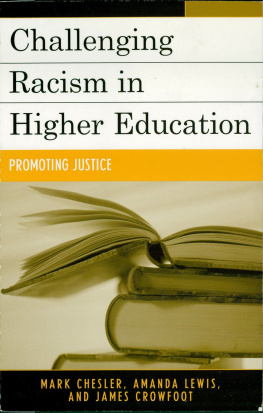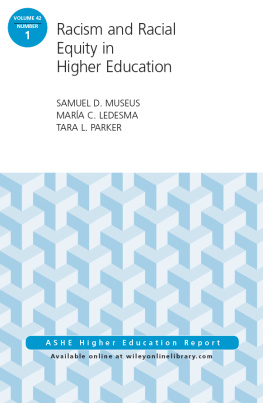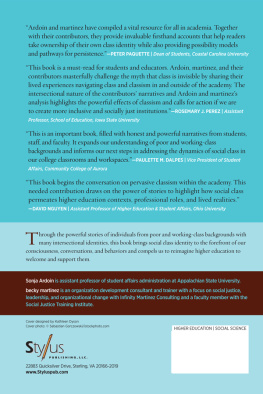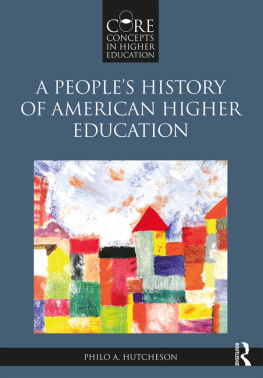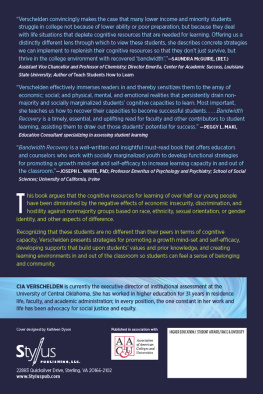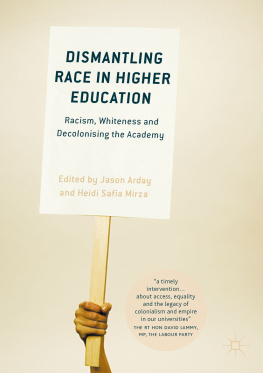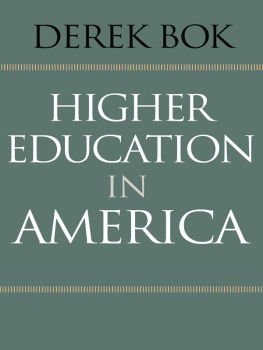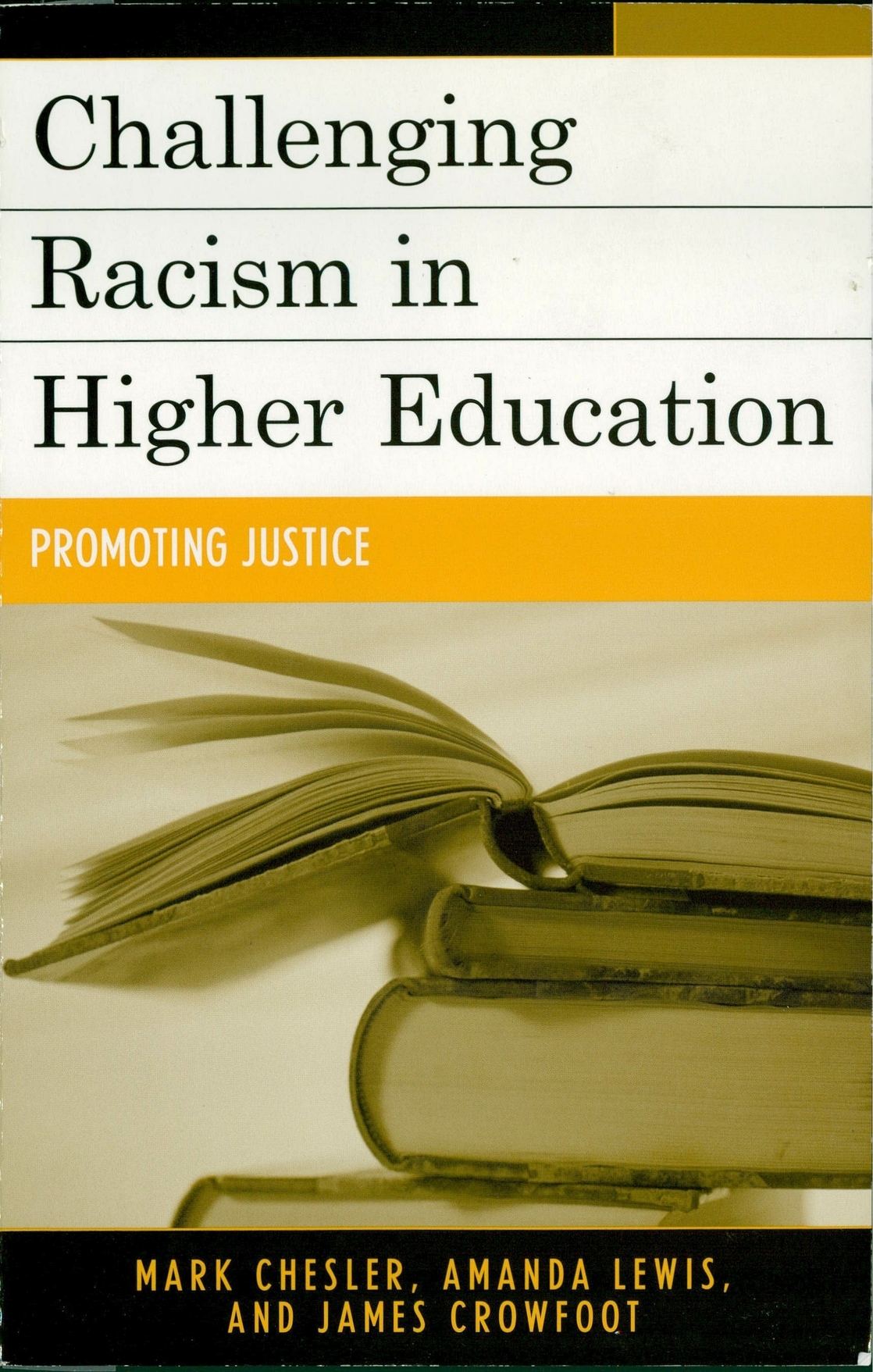Mark Chesler is Professor Emeritus of sociology at the University of Michigan and executive director of Community Resources, Ltd., Ann Arbor, Michigan. His work on this volume is the outgrowth of several decades of research and action in the field of intergroup relations, racism, multiple forms of discrimination, and organizational/community change. He has been a central agent in University of Michigan programs in community service learning, intergroup dialogues, and faculty development.
Amanda Lewis is assistant professor of sociology and African-American Studies and a Faculty Fellow at the Institute for Research on Race and Public Policy at the University of Illinois at Chicago. The junior member of this team, she began working on this volume while finishing her Ph.D. in sociology at the University of Michigan. This project builds on much of her previous work, which has focused on ways of studying how race shapes daily life in K-12 education, and on the contours and manifestations of whiteness and racism.
James Crowfoot is Professor Emeritus of Natural Resources and Urban and Regional Planning and Dean Emeritus of the School of Natural Resources and Environment at the University of Michigan. Formerly he was director of the Pew Scholars Program on Conservation and the Environment. He also is the former president of Antioch College, Yellow Springs, Ohio. His contributions to this book continue his long-time work on organizational change in higher education and on advocacy for socioenvironmental change, including preservation of the natural environment and the pursuit of social and economic justice to overcome racism and other forms of oppression.
References
Aberle-Grasse, M. 2002. The Washington study-service year of Eastern Mennonite University. American Behavioral Scientist, 43 (5), 848-57.
Academe. 2003, May-June. Notabene. Pp. 7-8.
Achieving diversity: Race-neutral alternatives in American education. 2004. Washington, D.C.: United States Department of Education, Office of Civil Rights.
Adams, D. 1995. Education for extinction: American Indians and the boarding school experience: 1875-1928. Lawrence: University of Kansas Press.
Adams, J., Niss, J., and Suarez, C. 1991. Multicultural education: A rationale for development and implementation. Macomb. Western Illinois University Foundation.
Adams, M., Bell, L., and Griffin, P. (Eds.). 1997. Teaching for diversity and social justice: A sourcebook. New York: Routledge.
Adams, M., Jones, J., and Tatum, B. 1997. Knowing our students. In M. Adams, L. Bell, and P. Griffin (Eds.), Teaching for diversity and social justice: A sourcebook (pp. 311-26). New York: Routledge.
Aguirre, A. 1995. A Chicano farmworker in academe. In R. Padilla and R. Chavez (Eds.), The leaning ivory tower: Latino professors in American universities (pp. 17-28). Albany: State University of New York Press.
Allen, W. 1986. Gender and campus race differences in black student academic performance, racial attitudes and college satisfaction. Atlanta: Southern Educational Foundation.
. 1988. The education of Black students on white campuses: What quality the experience. In M. Nettles (Ed.), Toward black undergraduate student equality in American higher education (pp. 57-86). Westport, Conn.: Greenwood.
. 1992. The color of success: African-American college student outcomes at predominantly White and historically Black public universities. Harvard Educational Review, 62 (1), 26-44.
Allen, W., Epps, E., Guillory, E., Suh, S., and Stassen, M. 2002. Outsiders within: Race, gender and faculty status in U.S. higher education. In W. Smith, P. Altbach, and K. Lomotey (Eds.), The racial crisis in American higher education: Continuing challenges for the twenty-first century (pp. 189-220). Albany: State University of New York Press.
Allen, W., Epps, E., and Haniff, N. 1991. College in black and white: African-American Students in predominantly white and in historically black public universities. Albany: State University of New York Press.
Allen, W., and Jewell, J. 2002. A backward glance forward: Past, present and future perspectives on historically Black colleges and universities. Review of Higher Education, 25(3), 241-61.
Allen-Brown, V. 1998. African-American women faculty and administrators. In L. Valverde and L. Castenell (Eds.), The multicultural campus: Strategies for transforming higher education (pp. 169-87). Walnut Creek, Calif.: Alta Mira.
Almaguer, T. 1994. Racial fault lines: The historical origins of white supremacy in California. Berkeley: University of California Press.
Altbach, P. 1989. Perspectives on student political activism. Comparative Education, 25(1), 97-110.
Altbach, P., and Lomotey, K. (Eds.). 1991. The racial crisis in American higher education. Albany: State University of New York Press.
Alvarez, R., and Lutterman, K. (Eds.). 1979. Discrimination in organizations. San Francisco: Jossey-Bass.
American Council on Education. 1999. Making the case for affirmative action in higher education. Washington, D.C.: Author.
. 2002a, December 9. ACE report shows rate of increase in number of women and minority presidents slowing. Higher Education and National Affairs, 51 (22), 1-2. Accessed at www.acenet.edu/hena/issues , August 2003.
. 2002b. Executive summary and selected tables. In The American college president. Accessed at www.acenet.edu/programs/policy/president-study/index.cfm , August 2003.
American Society of Engineering Education. 2001. Profiles of engineering and engineering technology colleges. Washington, D.C.: Author.
Anderson, J. 1988a. Cognitive styles and multicultural populations. Journal of Teacher Education, 38, 1-8.
. 1988b. The education of blacks in the South: 1860-1955. Chapel Hill: University of North Carolina Press.
Anderson, J., and Adams, M. 1992. Acknowledging the learning styles of diverse student populations: Implications for instructional design. New Directions for Teaching and Learning, 49, 19-33.

